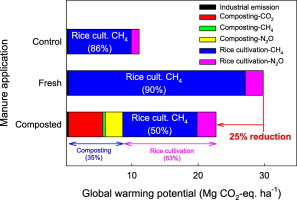当前位置:
X-MOL 学术
›
Sci. Total Environ.
›
论文详情
Our official English website, www.x-mol.net, welcomes your
feedback! (Note: you will need to create a separate account there.)
Beneficial effect of compost utilization on reducing greenhouse gas emissions in a rice cultivation system through the overall management chain
Science of the Total Environment ( IF 8.2 ) Pub Date : 2017-09-12 , DOI: 10.1016/j.scitotenv.2017.09.001 Seung Tak Jeong , Gil Won Kim , Hyun Young Hwang , Pil Joo Kim , Sang Yoon Kim
Science of the Total Environment ( IF 8.2 ) Pub Date : 2017-09-12 , DOI: 10.1016/j.scitotenv.2017.09.001 Seung Tak Jeong , Gil Won Kim , Hyun Young Hwang , Pil Joo Kim , Sang Yoon Kim

|
Livestock manure application can stimulate greenhouse gas (GHG) emissions, especially methane (CH4) in rice paddy. The stabilized organic matter (OM) is recommended to suppress CH4 emission without counting the additional GHG emission during the composting process. To evaluate the effect of compost utilization on the net global warming potential (GWP) of a rice cropping system, the fluxes of GHGs from composting to land application were calculated by a life cycle assessment (LCA) method. The model framework was composed of GHG fluxes from industrial activities and biogenic GHG fluxes from the composting and rice cultivation processes. Fresh manure emitted 30 Mg CO2-eq. ha− 1, 90% and 10% of which were contributed by CH4 and nitrous oxide (N2O) fluxes, respectively, during rice cultivation. Compost utilization decreased net GWP by 25% over that of the fresh manure during the whole process. The composting process increased the GWP of the industrial processes by 35%, but the 60% reduction in CH4 emissions from the rice paddy mainly influenced the reduction of GWP during the overall process. Therefore, compost application could be a good management strategy to reduce GHG emissions from rice paddy systems.
中文翻译:

通过整个管理链,堆肥利用对减少水稻种植系统中温室气体排放的有益影响
畜禽粪便的使用可以刺激温室气体(GHG)的排放,特别是稻田中的甲烷(CH 4)排放。建议在堆肥过程中使用稳定的有机物(OM)抑制CH 4排放,而无需计算额外的温室气体排放。为了评估堆肥利用对水稻种植系统净全球升温潜能值(GWP)的影响,通过生命周期评估(LCA)方法计算了从堆肥到土地施用的温室气体通量。该模型框架由工业活动产生的温室气体通量以及堆肥和水稻种植过程中的生物温室气体通量组成。新鲜肥料释放出30 Mg CO 2当量。ha − 1,其中90%和10%由CH 4贡献水稻种植期间分别释放出一氧化二氮和一氧化二氮(N 2 O)通量。在整个过程中,堆肥利用率使净GWP值比新鲜肥料下降了25%。堆肥过程将工业过程的全球升温潜能值提高了35%,但是稻田CH 4排放量减少了60%,这主要影响了整个过程中全球升温潜能值的降低。因此,堆肥的施用可能是减少稻田系统温室气体排放的良好管理策略。
更新日期:2017-09-13
中文翻译:

通过整个管理链,堆肥利用对减少水稻种植系统中温室气体排放的有益影响
畜禽粪便的使用可以刺激温室气体(GHG)的排放,特别是稻田中的甲烷(CH 4)排放。建议在堆肥过程中使用稳定的有机物(OM)抑制CH 4排放,而无需计算额外的温室气体排放。为了评估堆肥利用对水稻种植系统净全球升温潜能值(GWP)的影响,通过生命周期评估(LCA)方法计算了从堆肥到土地施用的温室气体通量。该模型框架由工业活动产生的温室气体通量以及堆肥和水稻种植过程中的生物温室气体通量组成。新鲜肥料释放出30 Mg CO 2当量。ha − 1,其中90%和10%由CH 4贡献水稻种植期间分别释放出一氧化二氮和一氧化二氮(N 2 O)通量。在整个过程中,堆肥利用率使净GWP值比新鲜肥料下降了25%。堆肥过程将工业过程的全球升温潜能值提高了35%,但是稻田CH 4排放量减少了60%,这主要影响了整个过程中全球升温潜能值的降低。因此,堆肥的施用可能是减少稻田系统温室气体排放的良好管理策略。










































 京公网安备 11010802027423号
京公网安备 11010802027423号